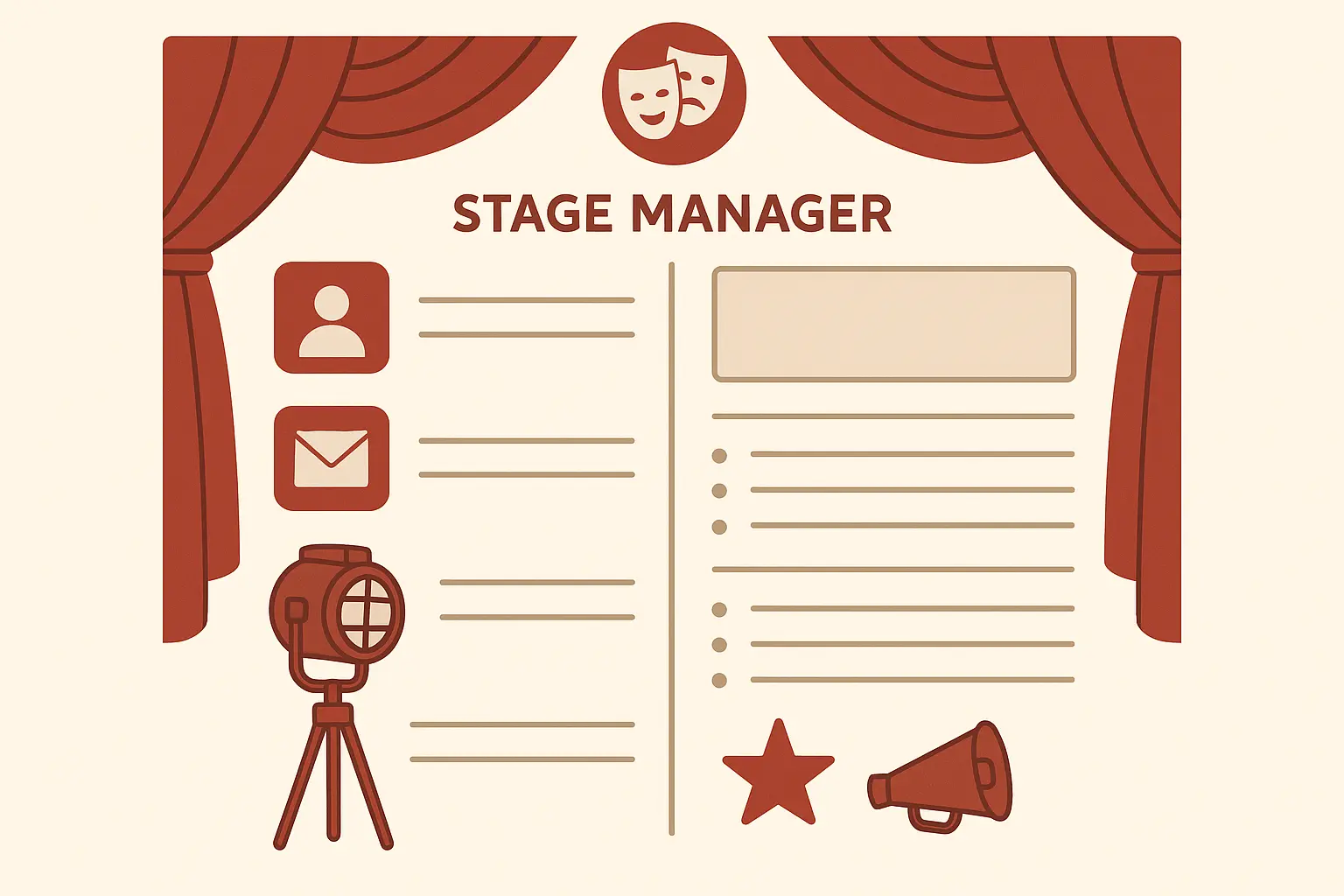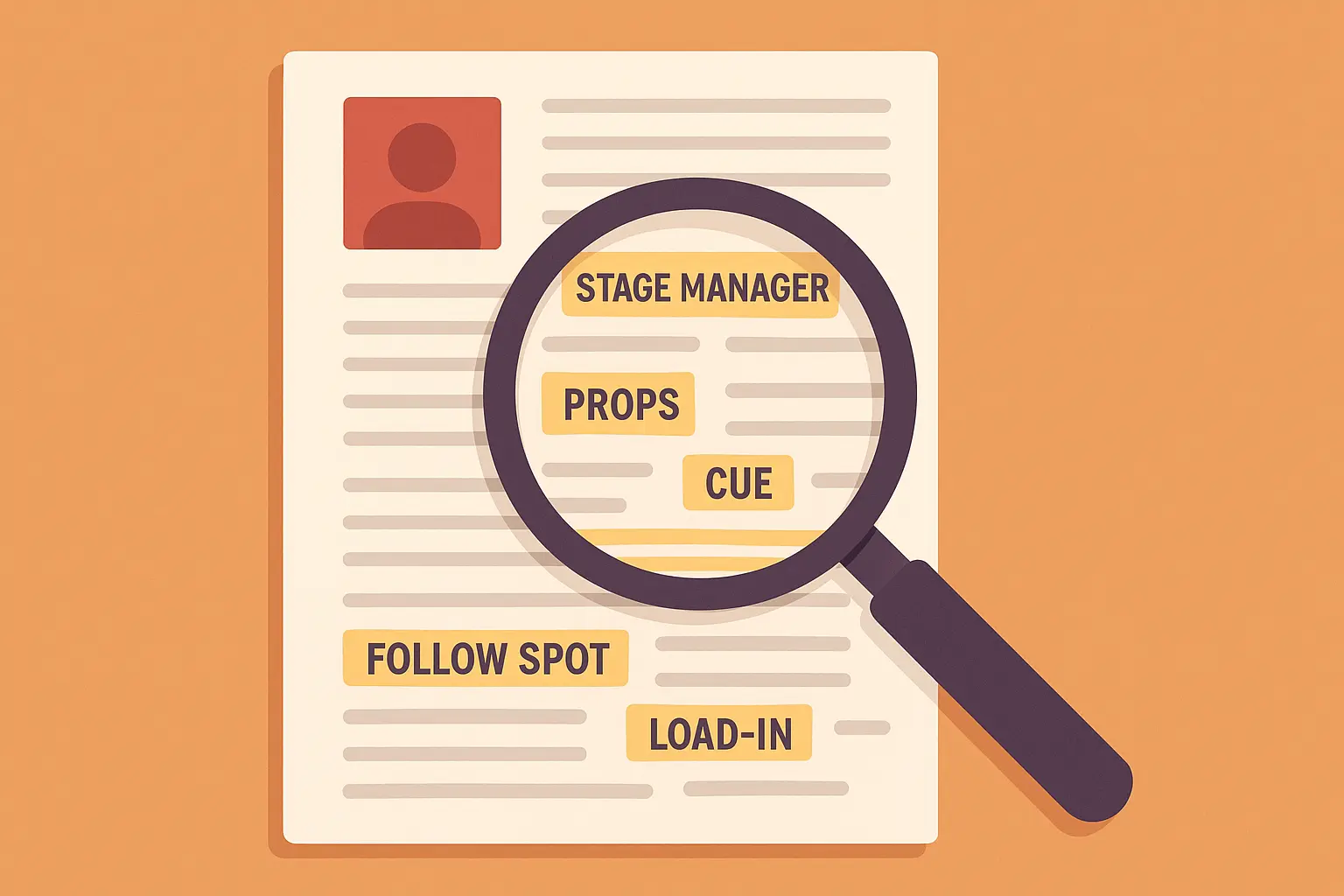Stage Manager Resume Secrets That Actually Get You Hired in Theater

After a decade in theater, I’ve watched too many brilliant stage managers get overlooked for one simple reason: their resumes sound like they’re applying to manage spreadsheets, not Shakespeare.
Here’s the thing—when a theater director scans your resume, they’re not looking for “synergistic solutions” or “optimized workflows.” They want to know: Can you keep 30 actors on schedule? Have you ever saved a show when the lead gets food poisoning an hour before curtain? Do you speak fluent theater?
That’s why creating a strong stage manager resume is less about corporate jargon and more about telling your theater story in a way directors understand.
While corporate jobs care about steady employment history and traditional career progression, theater values your ability to juggle complex productions, adapt when everything goes sideways, and keep the artistic vision alive under pressure. Your resume needs to speak the language of theater professionals who understand the difference between a successful load-in and a smooth tech week.

Table of Contents
- The Real Problem with Most Stage Manager Resumes
- Building Your Resume Foundation That Directors Actually Want to See
- Show Credits That Make Hiring Managers Pay Attention
- Technical Skills That Actually Matter (And How to Show Them)
- Specialized Strategies for Different Theater Gigs
- Formatting That Works for Both Humans and Computers
- Real Resume Examples That Landed Dream Jobs
- Advanced Tips for Competitive Markets
- How Resume Builder IQ Streamlines Your Career Documentation
- Final Thoughts
TL;DR
- Your stage manager resume needs theater-specific formatting that highlights show credits and technical skills differently than corporate resumes
- Real numbers (cast size managed, successful show runs, budget oversight) matter more than generic job descriptions in theater hiring
- Technical skills should be woven into your experience stories rather than stuck in boring lists
- Different theater sectors (touring, regional, production) need tailored approaches that emphasize relevant experience
- ATS-friendly formatting with theater keywords ensures your resume works for both computers and humans
- Great stage manager resumes balance creative flair with professional readability
The Real Problem with Most Stage Manager Resumes
Generic resume advice falls flat in theater. I’ve seen talented stage managers get passed over because their stage manager resume reads like a corporate manual instead of a production story. With experienced stage managers reporting they’ve enhanced show efficiency by 20% through strategic planning and problem-solving, it’s clear that real numbers matter more than vague descriptions in our industry.
The entertainment industry works differently than most sectors. When hiring managers scan your resume, they’re looking for proof that you can handle the unpredictable nature of live entertainment while keeping everything professional. They want to see that you get the unique blend of technical expertise and creative collaboration that defines what we do.
Your resume needs to show you can manage complex productions, coordinate diverse teams, and solve problems when the pressure’s on. Understanding professional resume formatting standards provides the foundation for creating theater industry documentation that meets both creative and technical requirements.
According to Enhancv’s stage manager resume analysis, successful resumes demonstrate measurable impact with achievements such as “enhanced show efficiency by 20%” and “reduced prop misplacement rate by 40%” through systematic improvements to production processes. These specific metrics give hiring managers concrete evidence of your capabilities rather than empty promises about being “detail-oriented.”
Building Your Resume Foundation That Directors Actually Want to See
Creating a Professional Summary That Captures Your Theater Identity
When building your stage manager resume, the foundation starts with a professional summary that actually highlights your theater identity. Skip the “results-driven professional” nonsense. Your summary should immediately establish your theater credibility with specific details about managing productions, working with creative teams, and handling the technical demands of live entertainment.
Start with your years of experience and the types of shows you’ve managed. Something like: “Experienced stage manager with 8+ years coordinating regional theater productions, managing casts of 15-40 performers, and overseeing technical teams through complex musicals and dramas.”
Follow this with your most impressive achievements or specializations. Maybe you’ve managed touring productions across multiple venues, or you have particular expertise with large-scale musicals. These details help hiring managers quickly assess whether your experience aligns with their current needs.
Here’s a strong professional summary example: “Experienced Stage Manager with 10+ years managing opera productions, specializing in efficient stage operations and compliance management. Successfully coordinated backstage operations for over 50 live shows annually with 98% schedule adherence. Skilled in digital scheduling tools, achieving 20% reduction in rehearsal conflicts while managing casts and crews of 50+ members.”
Contact Information That Shows You’re Industry-Ready
Your contact section needs more than just phone and email. Include your location and whether you’re willing to travel or relocate for productions. Many theater opportunities require flexibility, and showing this upfront can open doors to positions you might not have considered.
Union affiliations matter in professional theater. If you’re a member of Actors’ Equity Association or other relevant unions, include this information prominently. It signals your professional status and familiarity with industry standards.
Consider adding a link to your professional website or online portfolio if you maintain one. While not essential, having a digital presence that showcases your production work can set you apart from other candidates.
The theater industry continues to offer numerous opportunities for stage managers. Recent postings on Playbill show that Equity stage managers are in demand, with positions such as “PUBLIC CHARGE” at The Public Theater offering $2,204 weekly minimum for stage managers and $2,020 for assistant stage managers, demonstrating the value of professional union membership.
Show Credits That Make Hiring Managers Pay Attention
Formatting Your Production Experience for Maximum Impact
Your show credits are the most important part of your stage manager resume, and they deserve special treatment. Each entry should follow a consistent format that includes the show title, venue or production company, performance dates, and key personnel you worked with (director, producer, music director).
Don’t just list shows chronologically. Consider grouping similar types of productions or highlighting your most impressive credits first. If you’ve worked on well-known shows or with respected directors, make sure these details are prominent.
Include brief but specific descriptions of your responsibilities for each production. Rather than saying “managed rehearsals,” try “coordinated daily rehearsals for 25-person cast while maintaining detailed prompt book and tracking 47 lighting and sound cues.”
| Production Credit Format | Example |
|---|---|
| Show Title | Hamilton (National Tour) |
| Venue/Company | Broadway Across America |
| Dates | March 2023 – August 2023 |
| Key Personnel | Dir: Thomas Kail, Music Dir: Alex Lacamoire |
| Your Role | Production Stage Manager |
| Key Metrics | Managed 47-person cast/crew, 150+ performances |
Turning Daily Duties into Impressive Achievements
Numbers tell stories that generic descriptions can’t match. Instead of “managed production budget,” write “oversaw $75,000 production budget while keeping costs 8% under projected expenses.” These specifics give hiring managers concrete evidence of your capabilities.
Cast and crew size matters in theater. Managing a 10-person cast requires different skills than coordinating a 40-person musical with full orchestra. Be specific about the scale of productions you’ve handled.
Technical complexity deserves mention too. If you’ve managed shows with intricate lighting designs, complex set changes, or challenging sound requirements, include these details. They demonstrate your ability to handle sophisticated productions.
Professional stage managers consistently demonstrate measurable impact through their work. According to Resume Genius research, successful candidates report achievements such as “managed stage productions with budgets totaling $50,000 and cast and crew sizes of up to 50 people,” showing the importance of quantifying your production management experience.
Weaving Technical Skills Into Your Stories
Avoid creating a separate “skills” section that reads like a grocery list. Instead, integrate your technical skills and soft skills into your production descriptions where they make contextual sense.
For example, instead of listing “QLab proficiency” separately, write “programmed and operated QLab sound design for 12-show run, managing 200+ audio cues with zero technical failures during performances.”
Communication skills become more meaningful when you describe specific situations: “resolved scheduling conflicts between 15 cast members and 8 crew chiefs while maintaining positive working relationships and meeting all rehearsal deadlines.”
Strong skills integration example: “Coordinated technical rehearsals for Les Misérables using ETC Ion lighting console, managing 180 lighting cues while supervising 12-person crew. Implemented digital communication protocols that reduced setup time by 25% and eliminated missed cues during 45-performance run.”
Technical Skills That Actually Matter (And How to Show Them)
Software and Technology That Counts
Technology skills in theater go beyond basic computer literacy. You need to show familiarity with the specific tools that make modern productions possible. QLab proficiency is almost essential for most professional positions, but don’t stop there.
Lighting board experience (ETC consoles, GrandMA, etc.) can set you apart, even if you’re not the primary board operator. Understanding how these systems work helps you communicate more effectively with lighting designers and technicians.
Scheduling and communication software knowledge is increasingly important. Many companies use specific platforms for coordinating complex production schedules, and familiarity with these tools can give you an advantage.
Leadership and Problem-Solving When Everything Goes Wrong
Theater is unpredictable, and your resume needs to show you can handle whatever gets thrown at you. Describe specific situations where you’ve solved problems creatively or managed crises effectively.
Team coordination skills deserve detailed explanation. Managing a production involves working with diverse personalities, from temperamental performers to deadline-focused technicians. Show how you’ve successfully navigated these relationships.
Time management under pressure is crucial. Describe how you’ve kept schedules on track when everything seemed to be falling apart, or how you’ve adapted to last-minute changes without compromising production quality.
High-performing stage managers demonstrate significant impact on production efficiency. According to Resume Mentor’s analysis, top candidates report achievements such as “reduced rehearsal conflicts by 20%” and “achieved 95% on-time rehearsal start rate” through effective scheduling and communication protocols.
Specialized Strategies for Different Theater Gigs
Touring Stage Manager Essentials
Touring work requires a different skill set than resident theater positions. Your resume needs to emphasize adaptability, logistics coordination, and your ability to maintain show quality across varying venue conditions.
Highlight your experience with load-ins and strikes at different venues. Each theater has unique technical specifications, and showing you can adapt productions to different spaces demonstrates valuable flexibility.
Multi-venue coordination experience is gold in touring applications. Describe how you’ve worked with local crews, adapted to different technical capabilities, and maintained production standards across diverse performance spaces.
Production Stage Manager Focus Areas
Long-run productions present unique challenges that deserve special attention. Managing a show for months or years requires different skills than short-run productions.
Cast change management becomes crucial in extended runs. Describe your experience training replacement performers, maintaining show consistency, and preserving the director’s original vision through personnel changes.
Ongoing production improvement is another key area. Show how you’ve identified and implemented enhancements to productions over time while respecting the established artistic vision.
When preparing for stage manager interviews, understanding common interview question formats can help you articulate your production experience more effectively to hiring managers.
Regional theaters are actively seeking experienced stage managers for extended seasons. Recent opportunities such as Axelrod Performing Arts Center’s 2025-2026 Season demonstrate the ongoing demand for stage managers who can handle multiple productions including classics such as Cinderella and contemporary works such as The Dorothy Dandridge Musical.
Formatting That Works for Both Humans and Computers
Choosing Templates That Balance Creativity and Professionalism
Template choice matters more in theater than in many other industries. You want something that shows visual sensibility without being distracting or unprofessional. Clean, modern designs work better than overly decorative options.
ATS compatibility is increasingly important, even in theater. Many larger organizations use applicant tracking systems, so your resume needs to be formatted with clear headings, standard fonts, and proper structure.
Visual hierarchy helps hiring managers quickly find the information they need. Use consistent spacing, bullet points, and section breaks to create a scannable document that guides the reader’s attention effectively.
Stage Manager Resume Checklist:
Here’s a quick stage manager resume checklist to make sure your document is both industry-ready and ATS-friendly.
- Contact information includes union status and travel availability
- Professional summary highlights production types and real achievements
- Show credits follow consistent format with show, venue, dates, and personnel
- Technical skills integrated throughout experience descriptions
- Metrics included for cast/crew size, budget oversight, and performance counts
- ATS-friendly formatting with clear section headers
- Industry-specific terminology used naturally throughout
- PDF format for consistent presentation across devices
Theater Keywords and Language That Matter
Theater has its own language, and your resume should reflect your fluency in industry terminology. Words such as “prompt book,” “tech rehearsals,” “strike,” and “load-in” signal your insider knowledge.
Don’t force keywords unnaturally into your content. Instead, use them where they make sense contextually. This approach feels more authentic and demonstrates genuine industry experience.
Production-specific terms can also be valuable. If you’ve worked on musicals, mention “music direction coordination” or “orchestra management.” For straight plays, emphasize “blocking notation” or “script analysis.”
Real Resume Examples That Landed Dream Jobs
What Makes High-Performing Resumes Stand Out
Successful stage manager resumes share
Successful stage manager resumes share certain characteristics that set them apart from average applications. They prioritize production experience prominently, use specific metrics to quantify achievements, and demonstrate clear career progression.
Content patterns in effective resumes show how to balance comprehensive information with readability. The best examples provide enough detail to demonstrate competence without overwhelming the reader with unnecessary information.
Achievement-focused language transforms routine duties into compelling accomplishments. Instead of listing responsibilities, successful resumes emphasize results and specific contributions to production success.
High-performing resume excerpt: “Senior Stage Manager, Denver Center for the Performing Arts – Led team of four assistant stage managers, resulting in 25% increase in production efficiency. Implemented digital cueing system, reducing cue miss rate by 15% during performances. Coordinated stage operations for over 30 productions annually, consistently meeting performance deadlines.”
Customizing Templates for Theater Applications
Standard resume templates need modification to work effectively for stage manager applications. You’ll need to adjust section priorities, create space for detailed production credits, and incorporate theater-specific terminology naturally.
Personal branding integration helps your resume stand out while maintaining professionalism. Subtle design elements can reflect your understanding of visual presentation without compromising readability or professional standards.
Customization should enhance your content, not distract from it. The goal is creating a document that feels both professional and authentically connected to the theater world.
| Resume Section | Theater-Specific Adaptations |
|---|---|
| Professional Summary | Include production types, cast/crew sizes managed |
| Experience | Emphasize show credits, technical achievements, metrics |
| Skills | Integrate throughout experience rather than separate section |
| Education | Highlight theater-specific degrees and certifications |
| Additional Sections | Add union affiliations, notable productions, awards |
Advanced Tips for Competitive Markets
Strategic Skills Integration Throughout Your Resume
Skills integration creates stronger evidence of your capabilities than simple lists. When you describe how you’ve applied specific skills in production situations, you provide context that makes your competencies more credible and memorable.
Technical skills demonstration works best when connected to specific achievements. Instead of listing “lighting board operation,” describe how you “operated ETC Ion console for 47-cue lighting design, executing seamless transitions during 15 sold-out performances.”
Contextual skills presentation helps hiring managers understand how effectively you’ve applied your skills in real production environments. This approach creates more compelling evidence of your qualifications.
Keyword Strategy for Maximum Visibility
Keyword strategy requires balance between searchability and authenticity. You want to include relevant terms that hiring managers and ATS systems look for without making your content feel forced or unnatural.
Essential skills categories should be represented throughout your summary and experience sections rather than concentrated in one area. This approach provides multiple opportunities for keyword recognition while maintaining natural flow.
Industry terminology integration demonstrates your professional fluency while improving your resume performance in various screening processes. The key is using these terms where they naturally fit your experience descriptions.
Understanding salary expectations in specialized fields can help stage managers better position their experience and negotiate compensation packages effectively.
How Resume Builder IQ Streamlines Your Stage Management Career Documentation
Creating an effective stage manager resume involves balancing creative industry expectations with professional presentation standards. Resume Builder IQ’s platform understands these unique requirements and provides tools specifically designed for entertainment industry professionals.
The AI-driven keyword suggestions help you incorporate essential theater terminology naturally throughout your resume, while industry-specific templates ensure your document meets both aesthetic and functional requirements for theater applications.
Mobile-friendly interface means you can update your resume between rehearsals or during production downtime, keeping your career documentation current with your latest credits and evolving skill set. This flexibility is particularly valuable for stage managers who often work irregular schedules and need to respond quickly to new opportunities.
For stage managers exploring career transitions, understanding salary trends in related fields can provide valuable context for positioning your transferable skills and experience.
Ready to create a stage manager resume that actually gets you hired? Try Resume Builder IQ’s specialized theater templates and AI optimization tools to transform your production experience into compelling career documentation that stands out in competitive markets.
Final Thoughts
Look, you’ve got the skills to make magic happen eight shows a week. You can coordinate a 30-person cast through a quick change, troubleshoot a lighting board malfunction in the dark, and keep your cool when the lead actor decides to improvise during the final performance.
Don’t let a boring resume keep you in the wings.
Every production credit, technical skill, and crisis you’ve navigated contributes to your professional story. The key is presenting these elements in ways that resonate with theater industry hiring managers who understand the complexities and demands of live entertainment.
Your next dream gig is out there—whether it’s that touring production you’ve been eyeing, the regional theater that does the kind of work you love, or the Broadway house that’s finally posting for your dream position. Make sure your resume is ready for its spotlight moment.
Your stage manager resume is your chance to showcase how you handle the chaos of live theater and turn it into a seamless performance. Take the time to implement these strategies, and you’ll create documentation that truly represents your capabilities and opens doors to the opportunities you deserve in theater.








